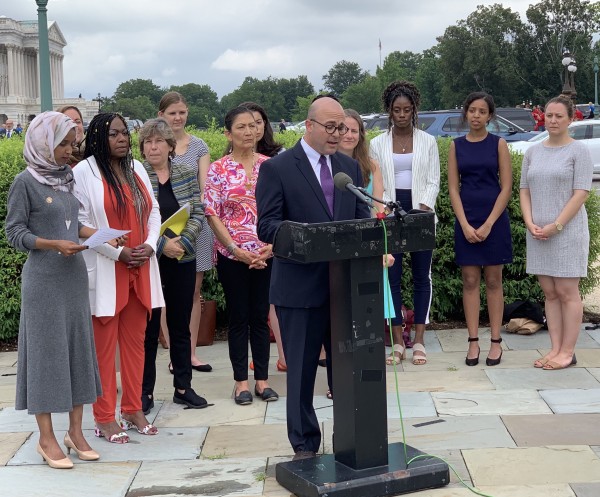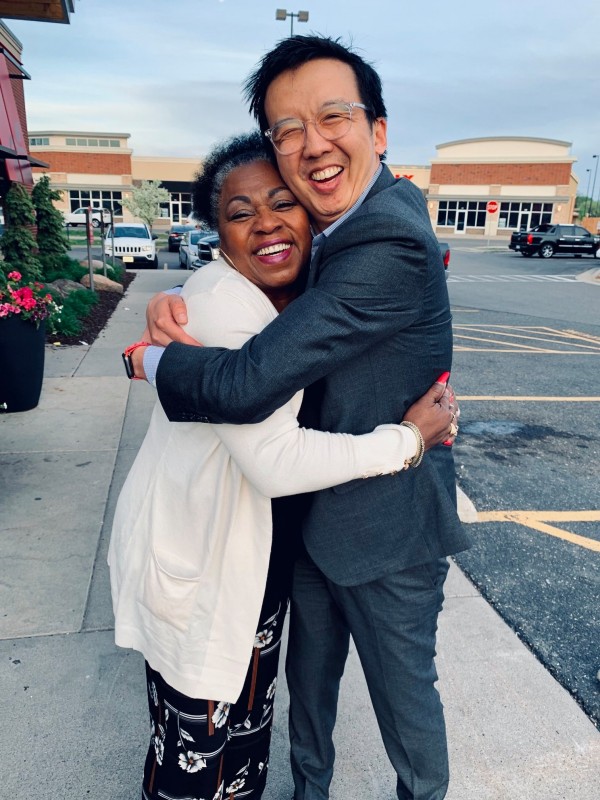I have never met anyone who supported “lunch shaming;” and there certainly isn’t a national campaign to punish children for school meal debt (at least not yet).
Yet “lunch shaming” over meal debt persists in every corner of the United States.
Since MAZON launched the first successful campaign to expose and ban “lunch shaming” practices in Minnesota in 2012, I have visited school lunchrooms in more than 25 states.
- Lunch shaming doesn’t just happen – it flourishes in ever more creative and cruel forms – where students who are unable to pay are regularly subjected to:
- Going through the lunch line only to have their trays of food dumped in the trash and be given half of a cheese sandwich as a replacement;
- Being branded with hand stamp with the word “money” or “low balance;”
- Exclusion in school activities – even graduation ceremonies – because of accrued debt.
Yesterday, MAZON stood proudly on the U.S. Capitol steps in support of the “No Shame at School Act,” introduced in the U.S. House of Representatives by Representatives Ilhan Omar (MN-5), Ben Ray Lujan (NM-3), and Deb Haaland (NM-1).
The bill makes significant strides to address the cruel ways that students are treated when their families are unable to pay for school meals. U.S. Senator Tina Smith (MN) will introduce the Senate version of this bill shortly.
Speaking alongside the bill’s co-sponsors, Josh Protas, MAZON’s Vice President of Public Policy, made clear MAZON’s belief that “no child should ever be punished, stigmatized, or shamed because of an inability to pay. Yet lunch shaming persists because of draconian local policies, outdated income guidelines for National School Lunch Program, and a lack of political will.”

Josh Protas, MAZON’s Vice President of Public Policy, speaking at the “No Shame at School Act” press conference on Capitol Hill.
Also speaking in support were Randi Weingarten, President of the American Federation of Teachers, as well as Valerie Castile, mother of the late Philando Castile, who routinely paid for hungry children’s lunches from his own pocket, a practice Valerie has continued in his memory to this day.
We already know how to prevent shaming and meal debt.
And if no one is explicitly FOR shaming kids, why can’t we muscle the will to put an end to it?
In American politics, it has long been acceptable – even profitable – to blame the poor for being poor.
Many, including school and elected leaders, can comfortably rationalize shaming poor students because they have been shaming their parents and families long before any child steps into the lunch room.
After the media first coined the derogatory term “welfare queen” in the early ‘70s, successive presidential campaigns have been fought and won partly on the strength of that offensive catchphrase and racial stereotype.
The practice of “lunch shaming” persists because the myth of the “welfare queen” persists as well.
Both serve the political interests of some by shifting the blame for substandard housing, segregated schools, low wages, lack of jobs, and food insecurity away from the structural forces that caused these problems while reinforcing stereotypes about low-income, minority families.
Lunch shaming persists because blaming the poor has worked for some in power.
Another reason for the lack of political will is the competing interests in the political process for everyone involved – from lunch workers and superintendents to food makers and legislators.
During the first campaign in Minnesota (and in the majority of states in which we have advocated around this issue), a frequent and staunch opponent to our proposed legislation and reform has been the local and national school nutrition associations.
The opposition from the state’s School Nutrition Association, whose members are school nutrition professionals and who employ well-paid lobbyists, generally comes down to two main arguments:
• “We don’t support this shaming ban because our members would never do this to kids in the first place.” In other words, they cannot support a solution to a problem that makes their members look bad and coldhearted, so they simply deny that the problem exists;
• “If we don’t punish kids, then everyone will stop paying, and the schools and districts will go bankrupt.” Or, as they say, it is just business.
Bear in mind that the National School Lunch Program is a publicly tax-funded federal program, – not a business – and viable options already exist to allow schools to provide universal free meals to every student regardless of income.
Or that the outdated income guidelines leave many low-income families ineligible for free meals even though they should be.
And year-end lunch room deficits have always existed even before the proliferation of shaming practices, and there is little evidence that shaming translates to payment from those who simply can’t afford to pay.
So what the school nutritionists are really saying is that “Our public image and self-interests trump the interests of protecting low-income kids and families.”
MAZON was not the first to discover the widespread practice of lunch shaming. Before joining up with MAZON in 2012, Jessica Webster, a seasoned public benefits advocate at Mid-Minnesota Legal Aid, had already documented numerous shaming incidents. But when they raised the issue to school and public officials and brought the findings to a national anti-hunger conference, the responses were loud and consistent: “this doesn’t happen,” or “you must be making this up or exaggerating,” and “we need to support the Nutrition Association.”
No one ever says they are FOR shaming kids; they just have competing interests that allow shaming to persist.
Since 2012, MAZON, through our synagogue and advocacy partners, has muscled the political will to confront and expose the biases and stereotypes, change the political calculation of school officials, elected leaders, and the anti-hunger movement – and yes, even nutrition associations. Our persistence has made it politically untenable for anyone to continue to ignore the issue of lunch shaming.
Today, more than 15 states have passed or are considering similar “no shaming” legislation. That’s what we mean by “political will.”
I applaud the leadership of Representatives Omar, Lujan, and Haaland in prioritizing the health and well-being of children above other interests.
We call on all Members of Congress to do the same and advance this legislation to ensure that we end lunch shaming once and for all.

MAZON National Organizer Samuel Chu with Valerie Castile, mother of the late Philando Castile, who routinely paid for hungry children’s lunches from his own pocket, a practice Valerie has continued in his memory to this day.